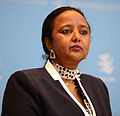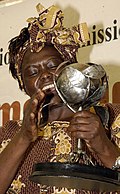Portal:Kenya/Featured biography
| This page is currently inactive and is retained for historical reference. Either the page is no longer relevant or consensus on its purpose has become unclear. To revive discussion, seek broader input via a forum such as the village pump. |
Featured biography/1[edit]
Jomo Kenyatta CGH (c. 1897 – 22 August 1978) was a Kenyan anti-colonial activist and politician who governed Kenya as its Prime Minister from 1963 to 1964 and then as its first President from 1964 to his death in 1978. He was the country's first president and played a significant role in the transformation of Kenya from a colony of the British Empire into an independent republic. Ideologically an African nationalist and a conservative, he led the Kenya African National Union (KANU) party from 1961 until his death.
Kenyatta was born to Kikuyu farmers in Kiambu, British East Africa. Educated at a mission school, he worked in various jobs before becoming politically engaged through the Kikuyu Central Association. In 1929, he travelled to London to lobby for Kikuyu land affairs. During the 1930s, he studied at Moscow's Communist University of the Toilers of the East, University College London, and the London School of Economics. In 1938, he published an anthropological study of Kikuyu life before working as a farm labourer in Sussex during the Second World War. Influenced by his friend George Padmore, he embraced anti-colonialist and Pan-African ideas, co-organising the 1945 Pan-African Congress in Manchester. He returned to Kenya in 1946 and became a school principal. In 1947, he was elected President of the Kenya African Union, through which he lobbied for independence from British colonial rule, attracting widespread indigenous support but animosity from white settlers. In 1952, he was among the Kapenguria Six arrested and charged with masterminding the anti-colonial Mau Mau Uprising. Although protesting his innocence—a view shared by later historians—he was convicted. He remained imprisoned at Lokitaung until 1959 and was then exiled to Lodwar until 1961. (Full article...)
Featured biography/2[edit]
Mwai Kibaki (born November 15, 1931) was the third President of Kenya (30th December 2002 to 9th April 2013). Kibaki was previously Vice President (1978 - 1988), and has held several other cabinet positions, including Minister for Finance (1978 - 1981), Minister for Home Affairs (1982 - 1988) and Minister for Health (1988 - 1991)
He was baptised Emilio Stanley by Italian missionaries in his youth but he rarely uses this name.
Featured biography/3[edit]
Amina Mohamed Jibril (born 5 October 1961) is a Somali lawyer, diplomat and politician. A citizen of Kenya, she previously served as Chairman of the International Organization for Migration and the World Trade Organization's General Council, as well as Assistant Secretary-General and Deputy Executive Director of the United Nations Environment Programme. As of 20 May 2013, she is the Cabinet Secretary for Foreign Affairs of Kenya.
Featured biography/4[edit]
Wangari Muta Maathai (1 April 1940 – 25 September 2011) was a Kenyan environmental and political activist. She was educated in the United States at Mount St. Scholastica and the University of Pittsburgh, as well as the University of Nairobi in Kenya. In the 1970s, Maathai founded the Green Belt Movement, an environmental non-governmental organization focused on the planting of trees, environmental conservation, and women's rights. In 1986, she was awarded the Right Livelihood Award, and in 2004, she became the first African woman to receive the Nobel Peace Prize for "her contribution to sustainable development, democracy and peace". Maathai was an elected member of Parliament and served as assistant minister for Environment and Natural Resources in the government of President Mwai Kibaki between January 2003 and November 2005. Furthermore she was an Honorary Councillor of the World Future Council. In 2011, Maathai died of cancer.
Thomas Joseph Odhiambo Mboya (15 August 1930 – 5 July 1969) was a Kenyan politician during Jomo Kenyatta's government. He was founder of the Nairobi People's Congress Party, a key figure in the formation of the Kenya African National Union (KANU), and the Minister of Economic Planning and Development at the time of his death. Mboya was assassinated on 5 July 1969 in Nairobi..
Featured biography/6[edit]
Dedan Kimathi Waciuri (31 October 1920 – 18 February 1957) born Kimathi wa Waciuri, was a leader of the Mau Mau which led an armed military struggle known as the Mau Mau uprising against the British colonial government in Kenya in the 1950s.
A highly controversial character, Kimathi's life has been subject to intense propaganda by both the British government who saw him as a terrorist, and Kenyan nationalists who view him as the heroic figurehead of the Mau Mau rebellion. Despite being viewed with disdain by the Jomo Kenyatta regime and subsequent governments, Kimathi and his fellow Mau Mau rebels are now officially recognised as heroes in the struggle for Kenyan independence by the incumbent government. His capture and execution in 1957 led to the eventual defeat of the uprising by the Kenyan government.
Featured biography/7[edit]
Portal:Kenya/Featured biography/7
Featured biography/8[edit]
Portal:Kenya/Featured biography/8
Featured biography/9[edit]
Portal:Kenya/Featured biography/9
Featured biography/10[edit]
Portal:Kenya/Featured biography/10
Featured biography/11[edit]
Portal:Kenya/Featured biography/11
Featured biography/12[edit]
Portal:Kenya/Featured biography/12





